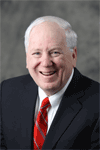Search
By Amb. Kenneth M. Quinn
Published in The Des Moines Register
Oct. 4, 2013
 Even though it was 34 years ago, I still vividly recall that sunny but chilly day in 1979 as I stood atop the hill at Living History Farms, mesmerized by Pope John Paul II as he addressed and then blessed the crowd of more than 350,000 people.
Even though it was 34 years ago, I still vividly recall that sunny but chilly day in 1979 as I stood atop the hill at Living History Farms, mesmerized by Pope John Paul II as he addressed and then blessed the crowd of more than 350,000 people.
I was riveted by the charismatic power of the new pontiff as the crowd surged toward him following his celebration of Mass and participation in an interfaith prayer service with a Jewish rabbi and Protestant bishop.
I also have never forgotten the sentences the holy father pronounced during his homily regarding the responsibilities and obligations of farmers and rural America. The pope clearly outlined the dual challenges that still confront agriculture in America and around the world today in terms of fostering sustainability of the land and water and plants, and using the harvest to feed the hungry in the world.
The pope said: “You who are farmers are stewards of a gift from God. ... You have the potential to provide food for the millions who have nothing to eat and thus help to rid the world of famine.”
John Paul’s call to action to confront hunger was tested even sooner than any of us might have expected. Just one month later, Gov. Robert Ray and I, along with several other American governors, were visiting a refugee camp in Thailand along the Cambodian border when we confronted a scene of human suffering right out of Dante’s Inferno.
Before our eyes, more than 30,000 Cambodian refugees lay strewn across an open field, emaciated from living more than four years under the genocidal Khmer Rouge. Starving and devastated by illness, they were dying at the rate of 50 to 100 a day. We witnessed the horrific scenes of bodies being bulldozed into mass graves and relief workers desperately trying to keep others alive with the small amounts of food and medicine they could garner.
The photos that Ray took of that tragic scene when published in The Des Moines Register and then other papers sent an electric current of concern across the state. Catholic Bishop Maurice Dingman and that same rabbi and Protestant bishop who stood with the pope urgently beseeched Ray to take some action.
With the support of the Register, Bishop Dingman and an array of civic leaders, we created Iowa SHARES, which stood for Iowa Sends Help to Aid Refugees and End Starvation.
Eventually, Iowans contributed more than $600,000, which allowed us to rush food, medicine and volunteer Iowa doctors and nurses to those Cambodian refugee camps, keeping thousands alive. We were fulfilling John Paul’s call to take food to the hungry. It was a great bipartisan and ecumenical moment in Iowa’s agricultural and humanitarian heritage — an event that will now be memorialized at our Oct. 15 Iowa Hunger Summit as we present the new Robert D. Ray Iowa SHARES Award to an individual who has provided similar leadership in confronting hunger at home and abroad.
The legacy of John Paul, who will be canonized a saint next April, will again come to the fore at our World Food Prize Borlaug Dialogue symposium on Oct. 16-18. We will address the issues of biotechnology and sustainability in meeting the single greatest challenge in all human history: whether we can sustainably feed the 9 billion people who will be on our planet by the year 2050. And, again, the issue will be assuring food for those who are hungry and suffering.
Our selection of three of the pioneers in agricultural biotechnology as our 2013 World Food Prize laureates has led to sharp criticism and engendered significant debate.
One critic of biotechnology from the Occupy movement (with whom I met for 2½ hours) told me that it is a one-or-the-other matter, with no middle ground possible. In her view, genetically modified crops undercut the sustainability of the Earth’s resources and can be harmful to humans.
Proponents of biotechnology, on the other hand, argue that such GMO crops offer the single best hope to allow small-scale, poor farmers in developing countries to successfully confront the drought, floods and saltwater intrusion that is resulting from the climate volatility farmers everywhere are experiencing.
The late Norman Borlaug, the Nobel Peace Prize laureate from Iowa who founded the World Food Prize, believed that biotechnology was critical for both sustainability and to feed all 1 billion people who are now suffering from food insecurity.
The question that will be debated at the World Food Prize is whether we are really prepared to exclude a technology that may help these poorest, poverty-stricken farmers.
We will have another significant figure from the Vatican to continue the dialogue John Paul II began during his historic visit: Cardinal Peter Turkson, a native of Ghana, who is president of the Pontifical Council for Peace and Justice of the Holy See.
In searching for an answer, it seems to me that John Paul had it right when he told that huge throng gathered in Iowa as the harvest was underway that we have to do both.
We have to preserve and sustain the great gifts that we have in our land, water and plants, and at the same time, we have to use science to multiply the harvest and continue to be true to our state’s great tradition of reaching around the globe to feed the hungry.
ABOUT THE AUTHOR: KENNETH M. QUINN, a retired U.S. State Department diplomat, is now president of the World Food Prize Foundation in Des Moines.


